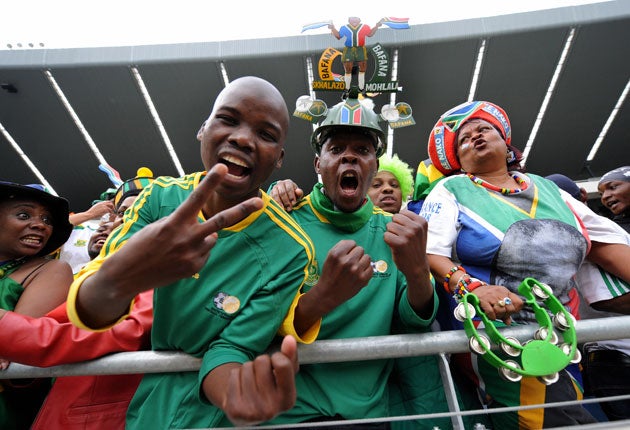World Cup will take place in full colour but please behave
It's going to be some party, though retribution may be swift if fans fall foul of law. Steve Tongue reports from South Africa

The footballing jamboree taking place in South Africa from 11 June to 11 July next year will be, according to Paul Bannister, "the first full-colour World Cup". As a trustee of the country's International Marketing Council, it is, of course, part of his job to sell the event; as an Englishman who has followed West Bromwich Albion since 1959 and was at Wembley when Bobby Moore held up the little golden trophy seven years later, he knows something of which he speaks.
"It's going to be very different from Germany four years ago and very different to England in 1966," he promises. "An extraordinary hybrid of two cultures." For English rattles and German klaxons, for instance, read the vuvuzela, an instrument already deafeningly familiar to those who watched – or listened to – the Confederations Cup, which ran as a successful dress rehearsal last summer. From the first match, the sound of the supporters' traditional trumpet led to calls for a ban, not least from broadcasters, and from players who complained they could not hear the referee's whistle.
It was soon a lively blogosphere debate, with opponents condemned to defeat from the moment Sepp Blatter, the man who effectively gifted Africa its first World Cup, made his opinion on the matter known. "This is what African and South African football is all about," he said, "noise, excitement, dancing, shouting, enjoyment. It is a celebration."
Something of that flavour was to be found even among a crowd of only 2,000 last Wednesday at the rebuilt Orlando stadium, where the local Pirates took on Maritzburg in a Premier League game. Two particular small groups of home supporters, several without shirts on a chilly evening and some in fancy dress, danced throughout the game and stopped blowing their vuvuzelas only when singing instead. The ground would have been quite a sight and sound 10 days earlier when the Pirates played their great rivals and new co-tenants Kaizer Chiefs (it was the Leeds band who spelt the name wrong, not the football club) in the first Soweto derby at the ground for 26 years; there was a full house of 40,000.
Next summer it will be a training ground, perched high above the sprawling townships, in one of which, Orlando West, Nelson Mandela and Archbishop Desmond Tutu lived in the same street. The 12 World Cup grounds are all either finished or due to be completed before the draw on 4 December and some, like Durban's with a more stunning arch than Wembley, and Cape Town's, between Table Mountain and the Atlantic Ocean, will impress the world.
Some 700,000 tickets have been sold so far, half to South Africans; only the hosts and the United States have sold more than the UK. Once the draw is made, phase three of ticketing sales will begin, with each opposing team offered 12 per cent of capacity at their three group matches. England's will be on sale only to members of the official supporters' club.
In the triangle of fans, locals and security forces, there may be a mutual wariness, though the latter group insist they will protect visitors as long as they behave. If not, retribution may be swift. Last week, the country's senior police spokesman, in between defending his force from accusations of brutality, boasted how two men found guilty of theft at a hotel during the Confederations Cup were tried and sentenced to five years' imprisonment within 24 hours of the crime.
Organisers are naturally keen to stress more positive factors, such as the legacy – a key word that England's 2018 bid team have picked up on – of the tournament. Irvin Khoza, the South African Dave Richards, with a finger in most footballing pies, is chairman of the local organising committee, the Premier League and Orlando Pirates. "With the World Cup, South Africa is joined by a common purpose," he said. "The impact it's made on infrastructure is [already] important." For Danny Jordaan, perceived as a rival but working with him as chief executive: "We're going out of the bricks and mortar stage to the event reality. We know all of the negative perceptions out there about South Africa. In 2009 we have had the British and Irish Lions, the ICC Trophy, the Indian Premier League, Confederations Cup, Manchester City out here, and all these things went off without a single hitch."
Jordaan must expect one or two along the way this time, but the ride has every chance of being thrilling; and in full colour, not the black and white of old.
Three great 2010 venues
Soccer City, Johannesburg (87,600 capacity) Will stage eight matches including the opening game on 11 June and the final on 11 July. Stunning look from outside, designed like a calabash (traditional African pot). Originally the FNB Stadium, where Nelson Mandela held his first rally after being released from prison.
Green Point Stadium, Cape Town (63,691) New stadium that hosts eight matches including a semi-final. Situated between Table Mountain and the ocean, but walking distance from the city centre along the waterfront. No expense spared: the budget over-run by more than 100 per cent.
Moses Mabhida Stadium, Durban (70,000) Eat your heart out, Wembley. The arch here, which will stage seven games including a semi-final, has a funicular taking visitors to its highest point, with spectacular views of the city and ocean. Centrepiece of Durban's bid for the 2020 Olympics.
Steve Tongue
Subscribe to Independent Premium to bookmark this article
Want to bookmark your favourite articles and stories to read or reference later? Start your Independent Premium subscription today.

Join our commenting forum
Join thought-provoking conversations, follow other Independent readers and see their replies